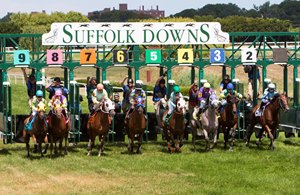Massachusetts Extends Racing and Simulcasting Law


The state statute authorizing live racing and simulcasting in Massachusetts that was set to expire at midnight June 30 has been extended for another 13 months in a bill passed by both houses of the legislature. The bill was delivered to the desk of Massachusetts Gov. Charlie Baker, who was expected to sign it before the deadline.
Not only does the bill allow racing, simulcasting, and advance deposit wagering to continue uninterrupted through July 31, 2021, but it also lets Sterling Suffolk Racecourse retain its rights to accept simulcast and ADW wagers even though live racing at Suffolk Downs ceased June 30, 2019, and there are no definite plans to host a future live meet anywhere in the state.
The racetrack property was sold by SSR to a real estate developer in 2017 but the deal provided that the former owners would retain the live racing and simulcasting operations. Suffolk Downs is in the process of being converted to a mixed, multi-use, massive retail and residential development, but the on-site simulcast operation continued in the clubhouse until it was closed to the public under the state's COVID-19 protocol plan.
Chip Tuttle, the chief operating officer of SSR, said via text that they are hoping to reopen for on-site simulcasting at Suffolk Downs in time for the start of the Saratoga Race Course meet July 16 as part of Phase 3 of Baker's plan to reopen Massachusetts, which was hard hit by COVID-19 cases and deaths. SSR's plan for reopening is on the agenda for the meeting of the Massachusetts Gaming Commission July 2.
This latest action by the state legislature is yet another in a long line of extensions in recent years.
The current law was set to expire Jan. 15, 2020 but was extended Jan. 13 to July 1 before now being stretched to July 31, 2021. Last year, the racing and simulcasting law was due to sunset on Aug. 1, but state legislators burned the midnight oil until a few minutes past deadline on July 31, 2019 to reach agreement on that extension.
In 2018, a crisis was created when the legislature allowed the law to expire at midnight July 31 so all live racing and simulcasting was brought to an abrupt halt Aug. 1. An emergency session was needed to rush a bill through the statehouse and then be signed by the governor so normal operations could resume the following day, racing could resume, and employees could return to work.
Even though due to the pandemic shutdown there is currently no live racing at Plainridge Park Casino, the state's harness track, and no on-site simulcasting there, at Suffolk Downs, or at Raynham Park, which is the former live Greyhound track, a July 1 expiration of the law would have shut down all ADW operations in Massachusetts and had a negative effect in the midst of a severe economic downturn.
Some lawmakers are said to be working on legislation that would end the practice of short-term extensions and authorize a long-term solution in a bill to give needed security to the racing and breeding industry and its stakeholders.
At the same time, the MGC wants the legislature to grant it broader powers to regulate the racing industry.
On July 8 the MGC's Horse Racing Committee, which is a subcommittee, has scheduled a meeting to take up the matter of potentially reallocating the way in which the Race Horse Development Fund is distributed.
The RHDF was established as part of the state's 2011 expanded gaming law, which authorized casino gambling, as a way to protect the struggling Thoroughbred and Standardbred racing and breeding industries. The RHDF is fueled by a percentage of the profits from the one slots machine facility and two full casinos, and though all have been shuttered through the pandemic, there are still millions of dollars at stake.
The RHDF requires that the monies be divided between the two breeds, with 80% dedicated to purses, 16% to breeders, and 4% to backstretch welfare. In 2014 the HRC split the fund 75%-25%, Thoroughbred to Standardbred, but over time has altered the splits to instead favor the harness industry 65%-35%.
At a meeting earlier this year the Standardbred horsemen argued that since there is no longer live Thoroughbred racing in Massachusetts, they should be given 100% of the RHDF. The Thoroughbred horsemen maintain that the breeders and their members depend upon their shares and that without money for purses no developer will be interested in making the large capital investment to build a new track and revive live racing.
